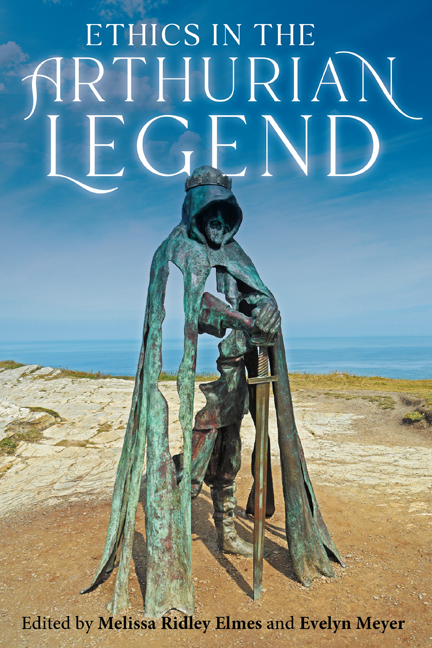Book contents
- Frontmatter
- Contents
- List of Contributors
- Foreword
- Acknowledgments
- Introduction
- 1 Arthurian Ethics before the Pentecostal Oath: In Search of Ethical Origins in Culhwch and Olwen
- 2 Too Quickly or Not Quickly Enough, Too Rash and Too Harshly: The Arthurian Court’s Lack of Ethics in Hartmann von Aue’s Erec and Iwein and Wolfram von Eschenbach’s Parzival
- 3 The Ethics of Arthurian Marriage: Husband vs Wife in Hartmann von Aue’s Iwein
- 4 Arthurian Ethics and Ethical Reading in the Perlesvaus
- 5 Translation Praxis and the Ethical Value of Chivalry in the Caligula Brut
- 6 Imperial Ambitions and the Ethics of Power: Gender, Race, and the Riddarasögur
- 7 Lowland Ethics in the Arthur of the Dutch
- 8 Contesting Royal Power: The Ethics of Good Lordship, Sir Gawain and the Green Knight, and the March of Wales
- 9 “As egir as any lyoun”: The Ethics of Knight-Horse Relationships in Lybeaus Desconus
- 10 Malory’s Ethical Dinadan: Moderate Masculinity in a Crisis of Hypermasculine Chivalry
- 11 Virtus, Vertues, and Gender: Cultivating a Chivalric Habitus in Thomas Malory’s Tale of Sir Gareth
- 12 Kingly Disguise and (Im)Perception in Three Fifteenth- Century English Romances
- 13 “Adventure? What is That?” Arthurian Ethics in/and the Games We Play
- 14 The Ethics of a New Edition of Sir Thomas Malory’s Le Morte Darthur – and More Evidence for the Superiority of the Winchester Manuscript
- 15 The Ethics of Writing Guinevere in Modern Historical Fiction
- Afterword
- Index
5 - Translation Praxis and the Ethical Value of Chivalry in the Caligula Brut
Published online by Cambridge University Press: 10 January 2024
- Frontmatter
- Contents
- List of Contributors
- Foreword
- Acknowledgments
- Introduction
- 1 Arthurian Ethics before the Pentecostal Oath: In Search of Ethical Origins in Culhwch and Olwen
- 2 Too Quickly or Not Quickly Enough, Too Rash and Too Harshly: The Arthurian Court’s Lack of Ethics in Hartmann von Aue’s Erec and Iwein and Wolfram von Eschenbach’s Parzival
- 3 The Ethics of Arthurian Marriage: Husband vs Wife in Hartmann von Aue’s Iwein
- 4 Arthurian Ethics and Ethical Reading in the Perlesvaus
- 5 Translation Praxis and the Ethical Value of Chivalry in the Caligula Brut
- 6 Imperial Ambitions and the Ethics of Power: Gender, Race, and the Riddarasögur
- 7 Lowland Ethics in the Arthur of the Dutch
- 8 Contesting Royal Power: The Ethics of Good Lordship, Sir Gawain and the Green Knight, and the March of Wales
- 9 “As egir as any lyoun”: The Ethics of Knight-Horse Relationships in Lybeaus Desconus
- 10 Malory’s Ethical Dinadan: Moderate Masculinity in a Crisis of Hypermasculine Chivalry
- 11 Virtus, Vertues, and Gender: Cultivating a Chivalric Habitus in Thomas Malory’s Tale of Sir Gareth
- 12 Kingly Disguise and (Im)Perception in Three Fifteenth- Century English Romances
- 13 “Adventure? What is That?” Arthurian Ethics in/and the Games We Play
- 14 The Ethics of a New Edition of Sir Thomas Malory’s Le Morte Darthur – and More Evidence for the Superiority of the Winchester Manuscript
- 15 The Ethics of Writing Guinevere in Modern Historical Fiction
- Afterword
- Index
Summary
Extant in two quite different late thirteenth-century manuscripts, Laȝamon's Brut is a lengthy Middle English alliterative verse chronicle probably composed nearer the beginning of that century and adapted, ultimately, from Geoffrey of Monmouth's Historia Regum Britanniae (c. 1138). In spite of being the earliest vernacular English account of the life of the Briton King Arthur, a warrior who famously drove Germanic invaders out of Britain, the poem has also been commonly regarded in critical literature as distinctly “Saxon” in its form and themes, a sort of last atavistic gasp of resistance against the encroaching Continental cultural shift already well underway in England by the early 1200s. Haruko Momma has demonstrated that this foundational strand of scholarship emerged from the poem's earliest modern critics in the mid-1800s, many of whom studied the text primarily for its philological value. Frederic Madden, for example, influentially identified the poem as having been written in “Semi-Saxon,” a term, according to Momma, “first applied to the transitional vernacular of post-Conquest England by George Hickes and adopted by subsequent generations of scholars until at least the 1870s when Henry Sweet introduced the three-part division of Old, Middle, and Modern English.” These nineteenth-century philologists thus conceptualized Laȝamon and his national epic of “Englene londe” (England) as belonging to an era before the emergence of what they strictly considered “English.” The Brut, therefore, constituted some kind of semi-articulate grasping at the still abstract idea of a post- Hastings English state and people. There amid the sprawling 16,000 lines of a thirteenth-century English priest's national epic, scholars of the nineteenth and early twentieth centuries perceived a reflection of their own splintering empires: a defiant antiquarianism scaffolded by the language and social structures of an old world undergoing rapid and inexorable cultural change.
But this reading was not strictly accurate. Laȝamon's poem, for all its seeming originality, is at its core a translation and adaptation of the twelfth-century Old French Roman de Brut by the Jèrriais poet Wace. Madden acknowledges this fact, classifying the Brut as a “paraphrase,” but the tools of philology at the height of the British Empire were not perhaps as finely attuned to questions of cultural difference as their practitioners may have imagined.
- Type
- Chapter
- Information
- Ethics in the Arthurian Legend , pp. 109 - 130Publisher: Boydell & BrewerPrint publication year: 2023

